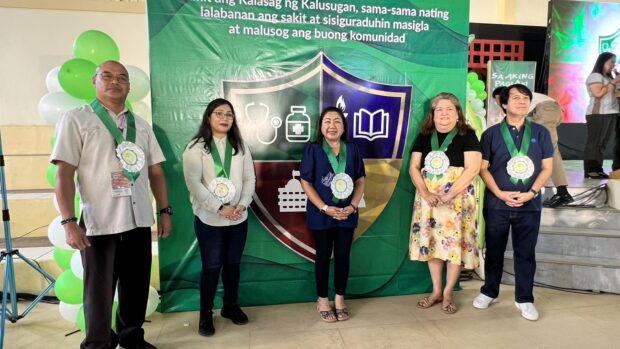The city government of Puerto Princesa has launched a unified effort to combat human papillomavirus (HPV) infections and cervical cancer among female schoolchildren, through a vaccination campaign supported by various public and private partners.

Stakeholders from left to right: Dennis M. Lucas, PhD, EPS 1, OIC, Palawan National School, Dr. Catherine Dela Rosa, Medical Officer IV, MARPRH Unit Head, Hon. Maria Nancy M. Socrates, Puerto Princesa City Vice Mayor, Carmen Auste, CEO and co-founder, Cancer Warriors Foundation Philippines, Dr. Ricardo Panganiban, City Health Officer
The campaign targets immunizations for 3,000 students across 15 Puerto Princesa schools over the course of one month. Its goal is to help reduce cervical cancer cases in the country, a disease largely attributed to HPV infection in an effort to help protect mothers, sisters, and daughters against cervical cancer.
Despite being a largely preventable disease, cervical cancer ranks as the second most common cancer among Filipino women. Data shows that almost 8 thousand women are diagnosed with cervical cancer annually, resulting in a Filipina dying every two hours daily.
Protecting girls from HPV and cervical cancer
Named “Sa Aking Paglaki, Walang HPV,” the first school-based vaccination event was held in Palawan National School on September 20, 2023. The event involved industry experts from the Department of Health (DOH), the Department of Education (DepEd), Ospital ng Palawan, Cancer Warriors Foundation Philippines, National PTA, and the Puerto Princesa City LGU – all in collaboration with healthcare company MSD in the Philippines.
As a strong first step, the city government of Puerto Princesa has committed to strengthen its vaccination initiatives. “[Partnering with multiple stakeholders] is the best approach,” says Mayor Bayron. “We can easily reach students through DepEd, and through the LGU we can reach parents,” he adds. “I encourage all the mothers and all the parents to give their consent for their children to be vaccinated. This is the best way to prevent your children from getting cervical cancer.”
Multiple stakeholders addressed the young students and parents during the program, encouraging them to get their HPV immunizations. “Ano man ang pwede nating gawin para makaiwas sa sakit na cancer, gawin po natin,” said Maria Nancy Socrates, Puerto Princesa’s Vice Mayor, a cancer survivor herself. “Kasama po diyan ang pagbabakuna,” she urged.
HPV vaccination now part of school-based immunization in Puerto Princesa, Palawan
The event marks a significant step toward strengthening the community’s defenses against vaccine-preventable diseases. “It takes the whole society, and a strong collaboration between the government, the healthcare industry, educators, the private sector, and the community to help eliminate cervical cancer,” said Mario Baquilod, MD, MPH, CESO IV, Regional Director of MIMAROPA’s Center for Health and Development.
This joint commitment aligns with the DOH’s own thrust of promoting “Kalasag ng Kalusugan” (Health Shield) by making healthcare services and vaccines accessible to all communities.
For his part, OIC of Palawan National School Dr. Dennis M. Lucas emphasized DepEd’s role as a vital ally in educating and safeguarding the health of our youth. “The Department of Education is your steadfast partner in guiding our youth regarding their health. You can rely on us to implement health programs within schools to educate parents and their children on preventing cervical cancer,” Lucas said.
An educational forum was also held, where medical experts talked about cervical screenings and HPV-related diseases before asking parents and students to view HPV as a preventable health concern rather than a stigma associated with sexual activity. An impactful testimonial was shared by a barangay health worker and cervical cancer survivor to further push the significance of the jab.
The HPV vaccine is administered in either two or three doses to maximize its efficacy, depending on age. Under the DOH program, Grade 4 students are eligible for two doses given six months apart. It lines up with the DepEd instructing all schools with face-to-face classes to resume delivering school-based health services, including inoculation.
ADVT.